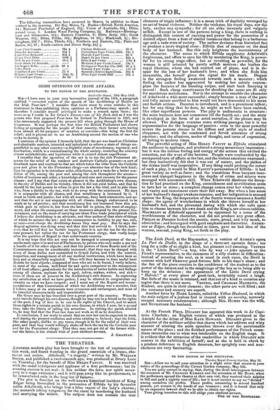THE THEATRES.
ANOTHER modern play has been brought to the test of representation this week, and found wanting in the grand essentials of a drama, cha- racter and action. Athelwold, "a tragedy," written by Mr. WILLIAM SMITH, and published a twelvemonth ago, was produced at Drury Lane on Thursday, for the benefit of Miss HELEN FAUCIT. It was received with the usual indulgence and applause of a first performance ; but its seeming success is not real : it has neither the form nor spirit neces- sary to a stageoexistence ; and it will pass away like its predecessors, to be remembered only in the long list of failures. The plot is founded on the well-known historical incident of King Edgar being forestalled in the possession of Elfrida by his favourite noble Athelwold, ho brings him a false report of the lady's charms ; the monarch taking vengeance for the cheat by murdering the husband and marry jug the widow. The subject does not contain the true
elements of tragic influence : it is a mean trick of duplicity revenged by an act of brutal violence. Neither the trickster, his royal dupe, nor the lady, excites any sympathy ; for all are alike intensely and vulgarly selfish. Except in one of the persons being a king, there is nothing to distinguish this contest of cunning and power for the possession of a desired object from a host of similar instances that belong to a barbarous age and a rude state of society. The author deviates from historical fact to produce a more tragical close : Elfrida dies of remorse on the dead body of her husband. But this only heightens the inconsistency of the character. The scene in which Elfrida supplicates Athelwold's forgiveness, and offers to save his life by murdering the King, is power- ful for its strong stage-effect, but as revolting as powerful, for the woman is still actuated by purely selfish motives : she loathes the royal libertine, whom she had courted out of pique, and is in de- spair for the loss of her husband's love; and when she finds him
inexorable, she herself gives the signal for his death. Disgust is the strongest feeling awakened towards such a monster ; which feeling the author has aggravated by making her calmly contem- plate the features of the bleeding corpse, and start back fancying it moved ! Such cheap contrivances for shocking the sense are fit only for murderous melodrama. Nor is the attempt to ennoble the character of Athelwold a whit more successful ; simply because a man of the pure and lofty nature ascribed to him would not have descended to his mean and foolish actions. Dunstan is introduced, and is a prominent talker ; but for any thing that he does, he might as well have been omitted, like other superfluous persons. The play is undramatic in structure : the main business does not commence till the fourth act ; and the story is developed in the form of an acted narration, if the phrase may be allowed. The dialogue contains some striking passages, but it is too argumentative for the language of passion : even in the most powerful scenes the persons discuss in the diffuse and artful style of studied eloquence, not with the condensed and fervid utterance of strong emotion ; and the allusions, modes of thought, and turns of expression, all belong to modern times. The powerful acting of Miss HELEN FAuctr as Elfrida stimulated the audience to applause, and produced a strong momentary impression: but it was the intense feeling and energy of the actress that excited the sensation, not the woes of the heroine. People were confounded by the unexpected turn of affairs at the last, and the violent emotions expressed ; but they instinctively felt that it was out of nature, and the pathos of the drama itself was inoperative. If any thing could prolong the career of such a play, it would be Miss FAucrr's personation of Elfrida : it had great variety as well as force ; and the transitions from buoyant inno- cence and tranquil happiness to the depths of crime and misery were managed with uncommon skill. When Ethelwold discloses the decep- tion he had practised on the King, astonishment and mortification seem to turn her to stone ; a complete change comes over her whole nature, and vanity and resentment exert their full sway. But when a late sense of her husband's danger awakens remorse, and her indignation is aroused against the King, the desperation of the frantic woman assumes a fearful shape : the agony of wretchedness in which she throws herself at her husband's feet, and the phrensied daring with which she calls upon him to choose between his own death and the King's, are almost sublime. MACREADY as Eihelwold appeared to be oppressed by a sense of the worthlessness of the character, and did not produce any great effect PHELPS as Dunstan looked the ascetic, stern, proud, and wily monk, to admiration ; and harangued with good emphasis and discretion. ANDER- SON as Edgar, though too theatrical at times, gave no bad idea of the wanton, sen4ual, young King, set forth in the play.


























 Previous page
Previous page